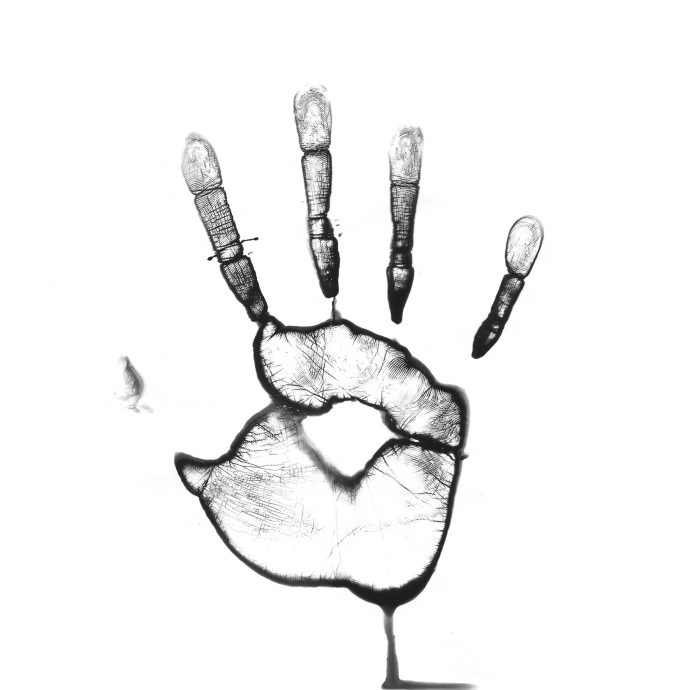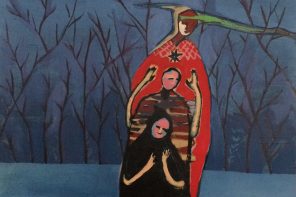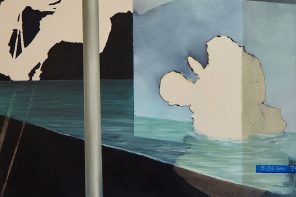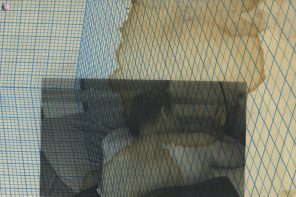Autobiography
I was taken in by two wolves whose whole diet was bacon. Each morning we shared the nine packs of bacon we fried then ran. We ran so fast the woods stretched a band of evergreen. We ran faster than life. We watched the nine-year-old flower girls in the forest live out their whole lives. Each morning they lived and before the end of our daily run in the afternoon they died again. Their hair curled brown to fall flat-white, their skin opaque before filling with light. Never mind the things they did. I named my favorite Heather. Her life and death, mere markers on the trail. We ran so fast the fat in our arteries would expand then explode and collapse, spilling out and over like liquid cheese. It smelled like bacon, bacon all fat and no lean: a treat. Our hearts came up our throats and out our mouths so tasty and we kept running. We were together and happy. We had everything and we could keep it. We ran past our own deaths, and when we came up on our hearts again we picked them up and swallowed them.
Dues
Aunt Reatha likes movies where the men die at the end, a bat to the head, blood shed after a long fall down to a death on a sharp object. She confides. I want her to be safe sharing these things with me. She smokes cigarettes in her chair and we watch the movies together after she’s fed me. She makes the same thing special for every day, a hotdog with melted cheese and no bun cut to many dangling pieces. I eat. I look up to her hard face and say, “Not me, Auntie.” I’m as happy as any child left home to be raised by the moldy middle-aged nanny. I think one day, I’ll have stayed over too long. My auntie rolls her hair tightly at night with plans to go out, but keeps her cap and gown on the whole day inside our brick house. The smoke that cloaks her has a sweetness. I’m not fed well here with my Auntie. She knows it. “I’ve lived this long,” she says. “And you’re just a growing boy.” After my coney, I get a small treat, a plum, a slice of cake. She says she loves me. She wouldn’t bait. The TV fills the room with light through the darkest. She doesn’t confine me to the living room. Sometimes I play outside. I find her right where I left her when I come in and sit down. “See there,” she says to me. “A good man for then. A good man for now.” Her body sinks into the recliner and I stay. I take notes until I shut down. She sees me there expecting no more than her boy. Her boy walking through the door after so many years in front of the small screen watching the men pay their dues. I’m off the hook. She’ll never see me that way. I’ll never have to walk in and say, “Auntie, me too.”
Family Mentality
You think of the sun as a boil, and the clouds, gray sediment that infect it. The light swells with pus and dims. The sky lets loose its infection. It falls in drops on the house. The view from the windows runs yellow with steam. You think the greenery running over the hill a mold over everything and still reaching. Every sound outside is a dying, worming its way in. Beyond the hill, where the sea lies, you’ve seen monsters in crude shadows under its surface, where you’ve thought to escape. The wash of its currents an acid burn on the sand, what remains of the Earth. You’ve spent years in a state of hardly breathing. The song you sing for comfort plagues your mother, makes her ruptured ears bleed though you love her, and with nowhere to go, holed from the world inside your only refuge, you dread inevitably your body will sour to waste inside it. The scene outside and the one within makes you question which is better. You think to open the door like so many before you. You’ve long thought the sun at the center. Its bulging, a poison. With a blade in hand, you stretch your arm out for its release, as its heat makes ash of your striving. You wave it blindly hoping to make your way. You wave it hoping to make the cut that saves.
Dustin Pearson is the author of Millennial Roost, forthcoming from Eyewear Publishing in 2018. He earned his MFA at Arizona State University, where he also served as the editor of Hayden’s Ferry Review. He was awarded the 2015 Katharine C. Turner Prize from the Academy of American Poets for his poem “The Black Body Auditions for a Play.” He is the recipient of fellowships from the Watering Hole, Cave Canem, and the Virginia G. Piper Center for Creative Writing. Born in Charleston, he is from Summerville, SC.




